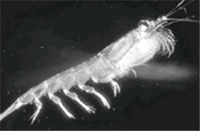Krill kill
 it seems that the first manifestations of global warming have already induced damages to the planet's ecosystem. However, scientists are yet to confirm if global warming indeed caused the recent decline in the krill population in the icy waters of the Antarctic Peninsula. Scientists supported by the us National Oceanic and Atmospheric Administration's ( noaa 's) Antarctic Program recently reported that this decline in krill population, which occurred gradually over the past decade, matches a corresponding decline in winter sea-ice development caused by warmer air temperatures. And this, they suspect, was caused by global warming. The decrease in sea-ice, however, has been a boon to another marine species: the gelatinous free-swimming tunicates or salps, which, over the same period, have witnessed a marked rise in population.
it seems that the first manifestations of global warming have already induced damages to the planet's ecosystem. However, scientists are yet to confirm if global warming indeed caused the recent decline in the krill population in the icy waters of the Antarctic Peninsula. Scientists supported by the us National Oceanic and Atmospheric Administration's ( noaa 's) Antarctic Program recently reported that this decline in krill population, which occurred gradually over the past decade, matches a corresponding decline in winter sea-ice development caused by warmer air temperatures. And this, they suspect, was caused by global warming. The decrease in sea-ice, however, has been a boon to another marine species: the gelatinous free-swimming tunicates or salps, which, over the same period, have witnessed a marked rise in population.
Krills are small shrimp-like crustaceans usually found in the frigid waters of Antarctica. As a source of food, these support animals ranging from whales to seabirds, fishes, squids, seals and even penguins. And since 1984, there has been a marked decline in their reproductive success.
In the latest study, low temperatures and extensive winter sea-ice development over a two-year period were found to be krill-friendly, while warmer temperatures and limited sea-ice development were found to favour salps. Salps not only compete with krill for food but also form an ecological
